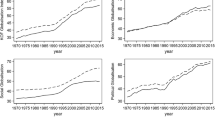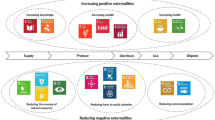Abstract
As far as trade as a cause of anti-globalism is concerned, Dani Rodrik’s analysis is built on the Stolper–Samuelson theorem, which shows only a wage decline through static equilibrium analysis. Although this distributional effect on labor welfare is one focal point of populist anti-globalism, other globalization-related issues – notably, obstinate joblessness and “rusted-out” towns – for which trade liberalization is partially accountable, are serious causes (as reflected in the Trump revolution). To explain these vexing issues, this commentary introduces three additional angles: the Rybczynski theorem, Schumpeterian structuralist perspective, and multinationals-driven globalization. These perspectives can help us to understand the dynamic, structural forces generated under the liberal world order, the forces that often impinge on national interests. Some new research agenda, especially a focus on MNEs’ supra-firm and supra-national ecosystems and their capacity to adapt to the currently disrupted global ecosystem, is suggested for international business scholars.
Similar content being viewed by others
REFERENCES
Akamatsu, K. 1935. Wagakuni Yohmohkohgyoh no Boheki Suisei [The Trend of Japan’s Trade in Woolen Goods]. Shogyoh Keizai Ronsoh, 13: 129–212.
Chang, H.-J. 2002. Kicking away the ladder: Development strategy in historical perspective. London: Wimbledon.
Clark, C. 1935. The conditions of economic progress. London: Macmillan.
Deeds, D., Barnard, H., & Vaaler, P. M. 2018. Call for papers on migrants, migration policies, and International Business Research: Current trends and new directions. Journal of International Business Policy. www.jibp.net.
Gereffi, G., Humphrey, J., & Sturgeon, T. 2005. The governance of global value chains. Review of International Political Economy, 12(1): 78–104.
Gerschenkron, A. 1962. Economic backwardness in historical perspective. Cambridge, MA: Harvard University Press.
Kaldor, N. 1972. The irrelevance of equilibrium economics. Economic Journal, 82(326): 1237–1255.
Kojima, K., & Ozawa, T. 1984. Micro- and macro-economic models of direct foreign investment: Toward a synthesis. Hitotsubashi Journal of Economics, 25(1): 1–20. Reproduced in P. Gray & J. Dunning (Eds). 1993. Transnational corporations and international trade and payments. London: Routledge.
Kuznets, S. 1966. Modern economic growth: Rates, structure, and spread. New Haven, CT: Yale University Press.
Lew, Y. K., Khan, Z., Czinkota, M., Amankwah-Amoah, J., & Puthusserry, P. 2018. Call for papers on strategic ambidexterity and performance consequences for the emerging economies multinationals. International Business Review.
Lin, J. Y. 2012a. New structural economics: A framework for rethinking development and policy. Washington, DC: World Bank.
Lin, J. Y. 2012b. The quest for prosperity: How developing economies can take off. Princeton, NJ: Princeton University Press.
Little, I. M. D. 1982. Economic development: Theory, policy, and international relations. New York: Basic Books.
Lundan, S. 2018. From the editor: Engaging international business scholars with public policy issues. Journal of International Business Policy, 1(1): 1–11.
Mudambi, R. 2018. Call for papers on the relationship between local and global connectivity. Conference at the Fox School of Business, Temple University, Oct. 26–27, 2018.
O’Reilly III, C. A., & Tushman, M. L. 2013. Organizational ambidexterity: Past, present, and future. Academy of Management Review, 27(4): 324–338.
Ozawa, T. 1970. The Rybczynski theorem: A diagrammatic note on a corollary proposition. Economica, 37(147): 293–296.
Ozawa, T. 2005. Institutions, industrial upgrading, and economic performance in Japan: The “flying-geese” paradigm of catch-up growth. Cheltenham: Edward Elgar.
Ozawa, T. 2009. The rise of Asia: The “flying-geese” theory of tandem growth and regional agglomeration. Cheltenham: Edward Elgar.
Ozawa, T. 2011. The role of Multinationals in sparking industrialization: From ‘infant industry protection’ to ‘FDI-led industrial take-off’. Columbia FDI Perspectives, Vol. 53, December 19.
Ozawa, T. 2016. The evolution of the world economy: The “flying-geese” theory of multinational corporations and structural transformation. Cheltenham: Edward Elgar.
Ozawa, T. 2018a. How MNEs help mobilize rural labor for industrialization, alleviating poverty (as they have done across East Asia): Is the “America First” policy a threat? Discussion Paper No. 81, APEC Study Center, Columbia University.
Ozawa, T. 2018b. The liberal world order and the job-offshoring backlash—in structuralist perspective. Global Economy Journal, 18(3): 1–11.
Ozawa, T. 2019. Flying-geese Theory: reassessment. In J. Y. Lin & C. Monga (Eds.), Oxford handbook of structural transformation. Oxford: Oxford University Press.
Restrepo, P. 2015. Skill mismatch and structural unemployment. Massachusetts Institute of Technology. Retrieved from http://pascual.scipts.mit.edu.
Rodrik, D. 2018. Populism and the economics of globalization. Journal of International Business Policy, 1(1–2): 12–33.
Rybczynski, T. M. 1955. Factor endowment and relative commodity prices. Economica, 22(88): 336–341.
Sahin, A., Song, J., Topa, G., & Violante, G. L. 2013. Mismatch unemployment. Staff Report No. 566, Federal Reserve Bank of New York.
Schioppa, F. P. (Ed.). 1991. Mismatch and labour mobility. Cambridge: Cambridge University Press.
Schumpeter, J. A. 1934. The theory of economic development. New York: Oxford University Press.
Schumpeter, J. A. 1942/1950. Capitalism, socialism and democracy. New York: Harper & Row.
Stolper, W. F., & Samuelson, P. A. 1941. Protection and real wages. Review of Economic Studies, 9(1): 58–73.
White, G. O. III, Rajwani, T. S., & Lawton, T. C. 2018. Call for papers on open for business in a closed world: managing MNE nonmarket strategy in times of populism and geopolitical uncertainty. Multinational Business Review.
ACKNOWLEDGEMENTS
The author is grateful to Professors Sarianna Lundan, Jeremy Clegg, and an anonymous reviewer for their constructive comments that helped improve this paper.
Author information
Authors and Affiliations
Corresponding author
Additional information
Accepted by Jeremy Clegg, Area Editor, 28 September 2018. This article has been with the author for one revision and was single-blind reviewed.
Rights and permissions
About this article
Cite this article
Ozawa, T. A note on Dani Rodrik, “Populism and the economics of globalization”. J Int Bus Policy 2, 182–193 (2019). https://doi.org/10.1057/s42214-018-0014-z
Received:
Revised:
Accepted:
Published:
Issue Date:
DOI: https://doi.org/10.1057/s42214-018-0014-z





